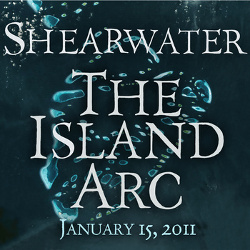Shearwater The Golden Archipelago
Shearwater continue to explore the beauty, menace, and fragility of the natural world – and that increasingly rare species, the indivisible album – on The Golden Archipelago, the band’s most absorbing and accomplished work to date. The new record is the third panel of a triptych that includes 2006’s enigmatic Palo Santo and 2008’s acclaimed Rook, albums linked by themes of environmental and personal decay and humans’ impact on nature. In The Golden Archipelago, Shearwater turn to a portrait of life on islands – a world of alternating lushness and austerity, numinous silences and sudden cataclysms, and the strange flowerings of plant, animal, and human life that only arise in isolation. These are intimate subjects for songwriter Jonathan Meiburg. Corel Draw Embroidery Plugin here. As a researcher, he’s camped on islands at the edges of the world, including the Falklands, Tierra del Fuego, the Galapagos, Madagascar, Nunavut, and New Zealand’s Chatham Islands, and once spent a few surreal months in a remote Aboriginal settlement in northern Australia.
Adding his grandfather’s WWII experiences as a radio operator in the South Pacific to these travels gave Meiburg plenty of fodder for the songs of The Golden Archipelago, in which he weaves these times and places together with common feelings of wonder, grief, and defiance. The Golden Archipelago opens with the first strains of the anthem of Bikini Atoll, sung by Bikinians in exile on the islet of Kili, where they’ve lived since atomic tests left their home uninhabitable. It’s a fitting introduction to the gentle, eerie “Meridian”, with its depiction of an air raid on an island garrison. From there, Shearwater take us on an island-hopping journey of spectacular contrasts, from the distant heights of “Landscape at Speed” to the snowy expanses of “Hidden Lakes”, from the manic, shuddering confines of “Corridors” to the isolated vistas of “Castaways”. It’s an album of lofty goals and great risk, but Shearwater have never been afraid to dream in widescreen.

Like Kate Bush’s Hounds of Love, Husker Du’s Zen Arcade, or Pink Floyd’s polarizing opus The Final Cut, The Golden Archipelago’s beautifully and strangely-wrought musical textures summon a majesty, drama, and individuality that few current records attain, or even attempt. The band worked for months with producer John Congleton (St. Vincent, Black Mountain, Polyphonic Spree, Explosions in the Sky) to capture the thrilling dynamics that have always marked their live performances, burnished by subtle orchestrations and cascades of mallet percussion.
The results are singular, revelatory, and demand to be appreciated as a whole. Islands under siege, islands of impenetrable solitude, islands of the world and islands of the mind – all are here in The Golden Archipelago, whose shores and reefs flicker and beckon, even as they crumble under rising seas. Shearwater continue to explore the beauty, menace, and fragility of the natural world – and that increasingly rare species, the indivisible album – on The Golden Archipelago, the band’s most absorbing and accomplished work to date. The new record is the third panel of a triptych that includes 2006’s enigmatic Palo Santo and 2008’s acclaimed Rook, albums linked by themes of environmental and personal decay and humans’ impact on nature. In The Golden Archipelago, Shearwater turn to a portrait of life on islands – a world of alternating lushness and austerity, numinous silences and sudden cataclysms, and the strange flowerings of plant, animal, and human life that only arise in isolation.
These are intimate subjects for songwriter Jonathan Meiburg. As a researcher, he’s camped on islands at the edges of the world, including the Falklands, Tierra del Fuego, the Galapagos, Madagascar, Nunavut, and New Zealand’s Chatham Islands, and once spent a few surreal months in a remote Aboriginal settlement in northern Australia. Adding his grandfather’s WWII experiences as a radio operator in the South Pacific to these travels gave Meiburg plenty of fodder for the songs of The Golden Archipelago, in which he weaves these times and places together with common feelings of wonder, grief, and defiance.